Learn all you need in this Steam Iron Buying Guide
Are you looking to buy a steam iron for ironing clothes, but you’re not sure where to start? Ironing is a chore, but the model you choose can help make the task easier. What features should you look for in an iron? HowToBuyA will give you the information you need to pick the best iron for you. We’ll also share some links to steam irons that may suit your needs. Want to skip the How-To and get straight to our steam iron suggestions? Click here for some HowToBuyA – Steam Iron Suggestions.
Affiliate notice: When you buy through our links, we may earn a commission.
Sections of this Steam Iron Buying Guide
How a Steam Iron Works
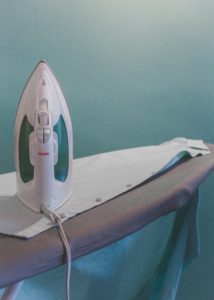 Most people have probably never given much thought to the process behind ironing. Before talking about what makes a good iron, we should quickly go over how ironing works to remove wrinkles.
Most people have probably never given much thought to the process behind ironing. Before talking about what makes a good iron, we should quickly go over how ironing works to remove wrinkles.
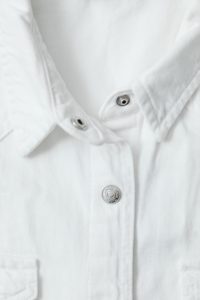 Bonded Fibers: Why does fabric wrinkle? The fibers in fabric are bonded together on a molecular level. The heat and water in the washing process cause these bonds to release, and the fibers are able to move about more freely. As the moisture leaves the fabric during the drying process, the fibers form new bonds, which can be misaligned, causing wrinkles.
Bonded Fibers: Why does fabric wrinkle? The fibers in fabric are bonded together on a molecular level. The heat and water in the washing process cause these bonds to release, and the fibers are able to move about more freely. As the moisture leaves the fabric during the drying process, the fibers form new bonds, which can be misaligned, causing wrinkles.
Unlock with Heat & Water: To reverse this process, we need two things: heat and water. Modern-day irons, with their ability to produce steam, give us both. The heat and steam from an iron release the bonds of the fabric, allowing the iron to press and smooth the fabric fibers into their correct position. As the moisture leaves, the bonds reform, leaving the fabric in a smooth, wrinkle-free condition.
Watch your temp!: You shouldn’t just crank up the iron to the highest setting and go at it. Fabrics have specific temperatures at which you should iron them. If the iron is too hot, some fabrics will melt or scorch. Moving from a lower temperature to a higher temperature, you have acrylic, nylon, silk, polyester, blends, wool, cotton, and linen. Cotton and linen wrinkle easily, and removing these wrinkles can be a challenge, requiring lots of heat and water.
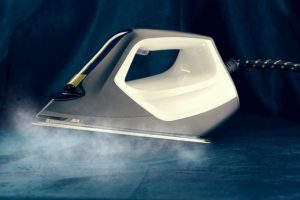 Steam limit: The steam function only works when the iron is at a temperature hot enough to produce steam. This temperature is too hot for the lower-temperature fabrics, so steam should only be used for wool, cotton, and linen. The lower-temperature fabrics are less likely to wrinkle, and their wrinkles can often be ironed out without water. If you do find yourself with a stubborn wrinkle while ironing a lower-temperature fabric, there are methods for applying water without using steam, from using a spray bottle to a damp cloth. These fabrics can be delicate, so it is a good idea to do an internet search for the proper ironing technique for each fabric. Always check the label for care instructions, as well.
Steam limit: The steam function only works when the iron is at a temperature hot enough to produce steam. This temperature is too hot for the lower-temperature fabrics, so steam should only be used for wool, cotton, and linen. The lower-temperature fabrics are less likely to wrinkle, and their wrinkles can often be ironed out without water. If you do find yourself with a stubborn wrinkle while ironing a lower-temperature fabric, there are methods for applying water without using steam, from using a spray bottle to a damp cloth. These fabrics can be delicate, so it is a good idea to do an internet search for the proper ironing technique for each fabric. Always check the label for care instructions, as well.
What to Look for When Buying a Steam Iron
Now that you know the process behind ironing, you can better understand what makes a great iron. Things to consider when choosing an iron include the physical design, the extra features it has, and the cost. Let’s take a look at those, starting with the design.
STEAM IRON DESIGN
For the most part, the shape of an iron has changed little from when your parents, or even your grandparents, were young. That’s not to say there haven’t been improvements: irons today are easier to manage, hold more water, glide more smoothly across fabric, and give you more precise control over the iron, to name just a few. Focusing on the design of the iron, let’s look at these areas: the size/weight, the water tank, the soleplate, the cord, the controls, and the wattage.
Size/Weight
The ideal size and weight of an iron depend on who is wielding the iron. Some people prefer their iron to be small and light; ironing takes time, and holding a heavy iron for an extended period can be difficult or even impossible for some. On the other hand, weight helps the ironing process; if an iron is too light, you have to press down on the iron, which takes energy. Some people want their iron to do the pressing work for them. Don’t forget that adding water to the tank will make it heavier. Travel irons are more compact to fit into luggage, so they weigh less.
Water Tank
The larger the tank, the less often you will need to refill it. This is only important if you have lots of laundry to iron at one time. A larger tank can make the iron more unwieldy. Tank openings should be large with clear access for easy refilling. Some irons have removable tanks, simplifying the task. Clear tanks make it easy to fill the tank to the max and to see how much liquid remains in the tank during and after use.
Soleplate
At the bottom of the iron, the surface that presses against the fabric is called the soleplate. Soleplates differ in what materials they are made of, their shape and size, and how many steam holes they have.
Soleplate Material: Soleplates can be made from various materials, including aluminum with or without nonstick coating, ceramic with or without nonstick coating, and stainless steel. No matter what the soleplate is made of, most irons claim to be nonstick, gliding over fabric smoothly. So, which material is best? Ceramic soleplates are durable and can eliminate static, but the general opinion among ironing forums is that stainless steel is the winner. Stainless steel glides better and can be cleaned more easily than ceramic or nonstick coatings. If you happen to burn a fabric onto the soleplate, it is much easier to remove from stainless steel. Also, nonstick coatings will tend to wear off over time, and some people are concerned about possible gasses released from nonstick coatings at high heat.
Soleplate Shape: The traditional shape of a soleplate is a rounded triangle with three corners, and most irons stick with this design. 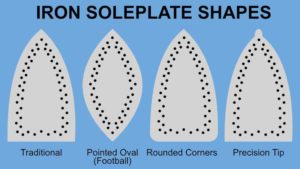 An alternate design, intended to prevent snagging, is an oval shape with points at both ends, like a football. Some soleplates have rounded-off corners on the bottom, again to prevent snagging. Some soleplates have what is called a precision tip, which protrudes slightly to help iron hard-to-reach places.
An alternate design, intended to prevent snagging, is an oval shape with points at both ends, like a football. Some soleplates have rounded-off corners on the bottom, again to prevent snagging. Some soleplates have what is called a precision tip, which protrudes slightly to help iron hard-to-reach places.
Soleplate Size: Larger soleplates cover more area, allowing you to make fewer passes with the iron, thus speeding up the process, which is especially useful when ironing larger pieces of fabric like bedsheets or rolls of fabric for quilting. Small soleplates can be useful for crafters who work with small pieces.
Soleplate Holes: Holes in the soleplate allow steam to pass through to the fabric. Soleplates typically have between 20 and 100 holes, and their size and positioning vary. The irons of German brand Rowenta manage up to 400 holes over the entire soleplate for more even steam distribution. Some users report that smaller holes get blocked with mineral deposits easier.
Cord
Cords should be a length that gives you enough room to maneuver around your ironing board. 8-foot to 10-foot cords are best. If you intend to use an extension cord with your iron, make sure the extension cord is heavy duty and rated for appliances. You don’t want to use an extension cord that is too thin for the wattage of your iron.
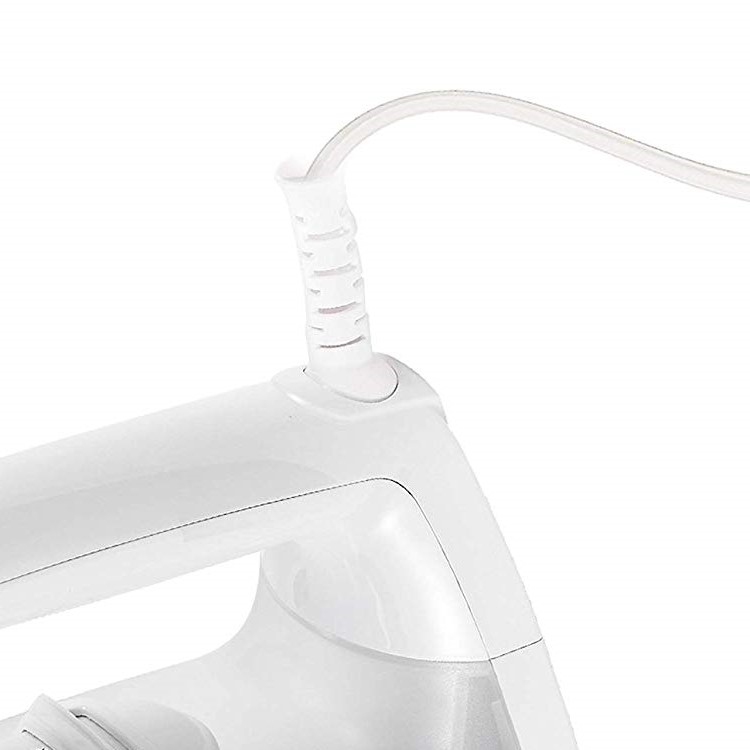
Some irons have a cord that can pivot or swivel on a ball, which allows you to position the cord in a direction you prefer. Irons with retractable cords are very popular and make storing the iron easier, although they do make the iron slightly bulkier. Another option is removable cords which allow you to wrap up the cord separately from the iron.
Cordless irons are a fairly new style. These irons come with a separate base in which the iron sits. The iron heats up in the base, and an indicator light will signal when the iron is ready. You then remove the iron from the base and begin ironing. When you need to reposition your fabric, you set the iron back into the base, and it will quickly reheat. Cordless irons receive mixed reviews on their ability to hold heat for long, but many users enjoy being cord-free.
Controls
Most irons are controlled by some combination of dials, knobs, levers, and buttons, and their layout and ease of use can make a big difference. The controls should be easy to access, easy to set, and once set, shouldn’t slip or change during use. The most important controls adjust the temperature and steam output.
Temperature Control: There are two styles of temperature control. The more traditional style is a variable dial that you turn to set the temperature from zero to max. There are usually markings around the dial to show where you need to turn the dial for specific fabrics. This style gives you more control over the iron when you want to nudge the heat up or down for a particular fabric. With the second style, you turn a knob or slide a switch to a particular fabric setting, for example, linen or cotton. With this style, you are not able to set the temperature between fabric settings.
Steam Controls: As mentioned, the steam function only works when the iron is at a temperature hot enough to produce steam. Most irons have a steam control that is separate from the temperature control. This steam switch may be a simple OFF/ON (DRY/STEAM) switch, or it may also have settings for low, medium, or high steam output. This switch must be set to ON in order to steam. On many irons, the steam switch must be set to OFF at lower temperatures, or the iron will leak. At higher temperatures, setting the steam switch to OFF allows dry ironing. Why would you want to dry iron? One example is iron-on patches, which require a high temperature but do not need steam. Some irons do not have a separate steam switch. The steam and temperature are controlled by the same dial. In this case, the only way to dry iron at higher temperatures is to remove the water from the tank.
Digital Controls: A few irons have digital LED displays. LED lights may indicate setting choices. These controls accomplish the same things as their manual counterparts but with push buttons instead of dials and knobs.
Wattage
Irons need to be hot to be effective. A hot iron can press clothing quickly and easily. Lower-wattage irons take longer and are less effective. 1500 watts is probably the minimum wattage you want for your iron, with the higher wattage the better.
Steam Iron Features
Irons can come with a lot of bells and whistles. Let’s go through these features so that you will know what they are when you see them, and you can decide which ones are important for you.
Steam Blast
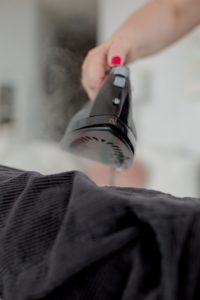 When the steam switch is on, there is a continual output of steam. Some irons have a button that activates a steam blast, also called steam shot, burst, or surge. It is a short, intense burst of steam used to target stubborn wrinkles. You might need to pause between blasts to avoid leaks.
When the steam switch is on, there is a continual output of steam. Some irons have a button that activates a steam blast, also called steam shot, burst, or surge. It is a short, intense burst of steam used to target stubborn wrinkles. You might need to pause between blasts to avoid leaks.
Water Spray
This button sends a spray of water onto the fabric, similar to if you used a spray bottle.
Vertical Stream
The iron is able to emit steam in a vertical position, similar to a clothes steamer, allowing you to steam curtains or clothes that are hanging.
Auto-Off
In old TV shows and movies, people were sometimes panicked because they couldn’t remember if they had left their iron plugged in and turned on at home. These days, most irons have an automatic shut-off feature which helps alleviate that concern. If an iron is left on its soleplate or on its side for over 30 seconds, the iron will shut off. In the upright position, the shut-off time varies from iron to iron, from 4 minutes up to 30 minutes. Quilters, especially, complain that 4 or even 8 minutes is too short since they like to alternate between sewing and ironing without turning the iron off. For general users who only iron a few articles of clothing at a time a 4-minute shut-off time is plenty. The auto-off is a reassuring feature for most customers, but as a safety precaution, it is always best to unplug your iron after use and store it properly.
Self-Cleaning
This feature allows the iron to remove minerals and impurities from inside the iron. You fill the tank and turn the heat to max. When the iron is ready, you hold the iron over the sink, soleplate facing down, while pressing the self-cleaning button for one minute. The iron will release steam and hot water while ejecting the unwanted particles. The process varies by machine, so make sure to follow the instructions in the manual. It is recommended to use the self-cleaning function at least every two weeks.
Calcium Filter
Often labeled anti-calc, this filter collects the calcium that can be in water, preventing it from damaging your iron. The filter should be cleaned monthly.
Anti-Drip
This feature ensures that there is no leaking or spitting of water while ironing at lower temperatures when the steam function is not available.
Pre-Testing
Many manufacturers fully test their irons before selling them to customers. As a result, you may find moisture in your iron’s water tank when you first open the packaging. This moisture is normal and not a sign that the iron is secondhand. Please do not return the iron because of this moisture. If the iron’s body appears new with no scratches, dings, or scuff marks, you can be assured that your iron is brand new.
Water Source
Tap water contains minerals that can clog up your iron, causing it to leak or drip water. These minerals can also cause your iron to spit and sputter dirty water onto the fabric, leaving stains. The amount of minerals in tap water can vary; water with high mineral content is labeled hard water, while low mineral content is labeled soft water. Most irons work best when you use distilled water, especially if you have hard water. The distillation process removes these minerals that can harm your iron. Some irons recommend using a 50/50 mixture of distilled and tap water. Some irons, including all Rowenta irons, allow tap water since they have anti-calc and self-cleaning features. Consult your owner’s manual to determine which water source is recommended for your iron. A common thought is that it’s not a matter of if your iron will leak, it’s a matter of when, hopefully later than sooner. The better you maintain your iron and follow the care instructions, the longer it should last.
Steam Iron Cost
Good value for the money: Fortunately, owning a decent steam iron isn’t going to cost you an arm and a leg. A good-quality, well-reviewed iron can be purchased at a very reasonable price, starting at around $20 for the least-expensive model up to $150 for the most-expensive Rowenta model.
Rowenta on top: German-made Rowenta is the best-known brand for high-quality steam irons. They are the standard upon which other irons are compared, and their higher prices reflect that. The more features an iron has, the pricier it will likely be, and Rowenta Irons are packed with features. Rowenta Irons are not free from quality issues, though. Their reviews on Amazon and other sites are no better and sometimes slightly worse than cheaper non-Rowenta models we list below, but that might be explained by higher expectations not being met. They do have many loyal users, however, and you are likely to be satisfied if you splurge on one.
Go big or hedge your bet: With the whole “will it leak?” issue in mind, many people feel it is better to buy a decent budget iron that can be easily replaced after a year or two versus spending big bucks on a higher-priced iron and hoping the iron doesn’t leak. Ultimately, the choice is yours.
HowToBuyA – Steam Iron Suggestions
Affiliate notice: When you buy through our links, we may earn a commission.
Non-Rowenta Steam Irons
Now that you have a good idea of what to look for in a steam iron, here are some of the best reviewed. The first group of steam irons is non-Rowenta irons. They have some great features at some great prices. You can see all the features by clicking on “More…” Clicking on any of the links will take you to the Amazon page, where you can take a closer look at each iron and check out their reviews for yourself.
Swipe or scroll right to see more steam irons.
 |
 |
 |
 |
 |
 |
 |
 |
 |
|
|---|---|---|---|---|---|---|---|---|---|
| Brand | Beautural | Shark | Mueller | Black+Decker | PurSteam | Beautural | Vremi | Chi | Chi |
| Model | 1-MR08US03 | GI305 | MU-77XB | D3030 | PSSI-01 | B071HFP57N | None | 13106 | 13101 |
| Watts | 1500 | 1500 | 1500 | 1600 | 1700 | 1800 | 1800 | 1700 | 1700 |
| Weight | 2.52 lbs | 3.2 lbs | 3.5 lbs | 3.03 lbs | 2.2 lbs | 3.18 lbs | 3.1 lbs | 4.15 lbs | 2.9 lbs |
| Soleplate Material | Ceramic Coated | Stainless Steel | Stainless Steel | Stainless Steel | Stainless Steel | Ceramic Coated Dual Plate | Ceramic | Titanium Infused Ceramic | Titanium Infused Ceramic |
| Click for more info |
More… | More… | More… | More… | More… | More… | More… | More… | More… |
Rowenta Steam Irons
The second group of irons is all Rowenta irons. Rowenta irons are pretty consistent for having the same features across all models. Every Rowenta iron has the following features: stainless steel soleplate, 8-minute auto-off, variable temperature control, separate steam, vertical steam, steam blast, water spray, anti-calc, self-clean, anti-drip, precision tip, and allowing tap water. Almost all of their irons are made in Germany (although the least expensive ones are made in China), and most of the irons have 400 holes. The areas where the Rowenta irons do vary are in their wattage, weight, tank size, and cord length/type, and price.
Swipe or scroll right to see more steam irons.
 |
 |
 |
 |
 |
 |
 |
 |
|
|---|---|---|---|---|---|---|---|---|
| Brand | Rowenta | Rowenta | Rowenta | Rowenta | Rowenta | Rowenta | Rowenta | Rowenta |
| Model | DW9280 | DW8080 | DW8360U1 | DW7180 | DW6080 | DW5280U1 | DW5260 | DW2459 |
| Watts | 1800 | 1700 | 1775 | 1750 | 1700 | 1725 | 1715 | 1725 |
| Weight | 3.85 lbs | 3.5 lbs | 3.32 lbs | 4 lbs | 3.46 lbs | 3.22 lbs | 3.8 lbs | 3.87 lbs |
| Tank Size | 350ml | 375ml | 305ml | 340ml | 300ml | 300ml | 310ml | 240ml |
| Click for more info |
More… | More… | More… | More… | More… | More… | More… | More… |
Wrap Up
We hope you are now equipped with all the information you need to go out and buy the perfect steam iron for you. Let us know which iron you decide on and why in the comments below. Have any ironing tips? Feel free to share!


















